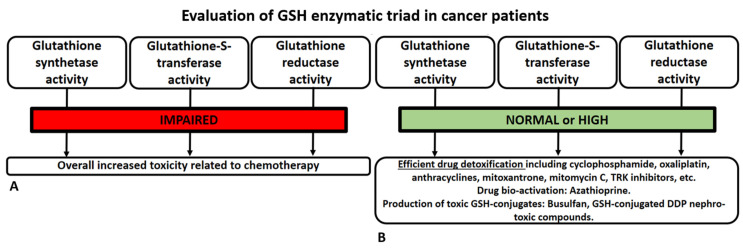Figure 4.
A rational use of GSH in cancer patients should not overlook an ideal and minimal evaluation of the enzymatic triad involved in GSH synthesis and metabolism (see polymorphisms, expression, and epigenetic control discussed in the manuscript). Indeed, there may be different activity levels of the enzymatic triad in the patient and the tumor, with indirectly assessable effects. When one of the enzymes has reduced activity, it affects the overall GSH production balance, leading to a decrease in its concentration (and corresponding antioxidant power). The scenario where there is reduced activity in cancer patients, in general, may be associated with increased chemotherapy efficacy, albeit at the cost of greater toxicity for the patient (A). In cases where the enzymatic triad functions well in healthy cells but is impaired in the tumor cells, it represents a positive scenario where chemotherapy can have a greater damaging effect on the neoplasm. However, as shown in the last panel (B), this is not true for all drugs. It would be desirable to further investigate the biology of cancer regarding these aspects, especially when the enzymatic triad is “overactive” only in the tumor. Such an approach could lead to the pharmacological design of specific inhibitors targeting the tumor enzymes involved in GSH metabolism.

